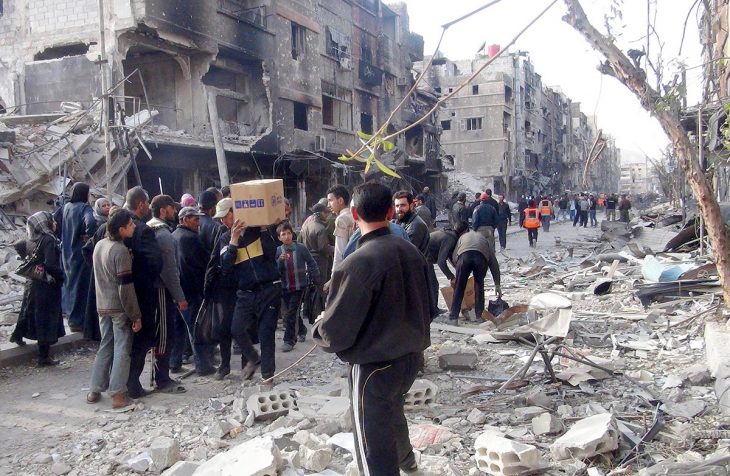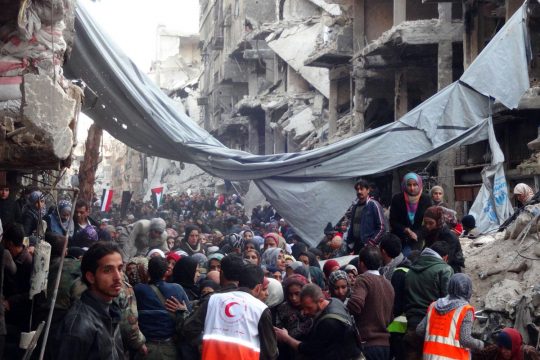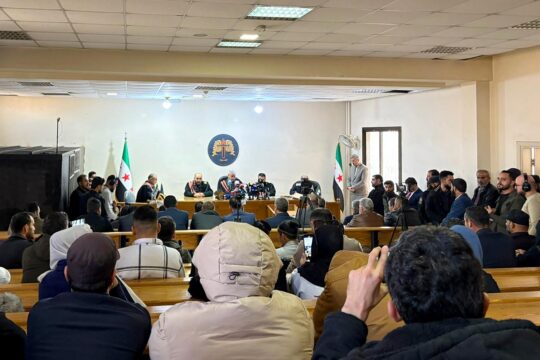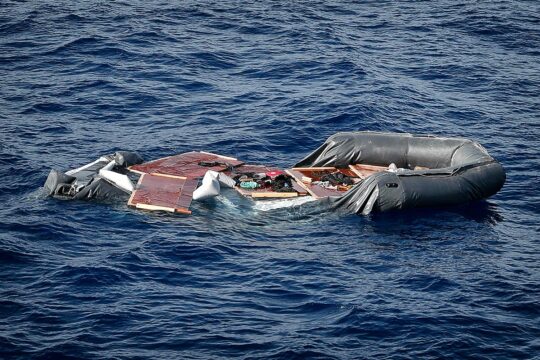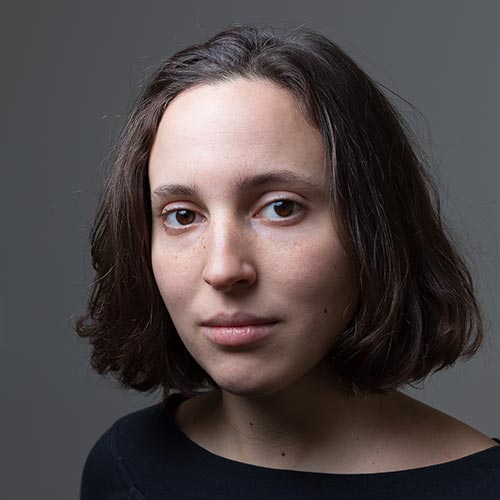In a small courtroom in Berlin, out of a large audience or media attention, a war crimes trial is nearing its end. It will be the third trial dealing with atrocity crimes committed under the Assad regime to be concluded in Germany. And it is the first to investigate the regime’s brutal practice of besieging and starving parts of the population to punish them for their opposition.
Last Thursday, after 30 days of trial, the prosecutors presented their closing statement. They asked the court to convict Moafak D., whose full name remains anonymous, of war crimes and to sentence him to life in prison. For the plaintiffs, whose closing arguments followed, this did not go far enough. Although they agreed with the requested sentence, they reiterated their belief that an additional indictment for crimes against humanity was needed to grasp the magnitude of the crimes and do justice to the long suffering of the civilians under siege.
Since August 2022, the Palestinian Syrian Moafak D. has been on trial for war crimes allegedly committed in Yarmouk, a former refugee camp for Palestinians that has turned into a district of Damascus. In March 2014, he allegedly fired a rocket-propelled grenade (RPG) into a crowd of civilians who had gathered to collect UN aid packages. At that time, the mostly Palestinian population of Yarmouk had been suffering from a total embargo since July 2013. Moafak D. was a member of one of the pro-regime militias who exerted brutal control over Yarmouk, enforcing the siege and tormenting its citizens. He purportedly had a personal motive for the attack: revenge for the death of his nephew, killed in a battle with the Free Syrian Army (FSA) two days prior.
Prosecutor Hannes Meyer-Wieck started his final plea by summarizing key moments in the defendant’s life: Moafak D. was born in 1967 as the tenth of twelve children. His parents had fled Palestine during the ‘Nakba’ in 1948, when about half of the Palestinian Arab population was displaced. The family settled in Damascus, where he left high school at the age of 15, to start working as a construction worker like his father. From 2007 on, he got involved with two Palestinian militias, the Popular Front for the Liberation of Palestine (PFLP) and the Free Palestine Movement (FPM) that had been close to the Syrian regime since the rule of Bashar al-Assad’s father Hafez. In 2017, he arrived in Berlin with his wife and three children through a family reunion programme, joining a son who had arrived before as an unaccompanied minor. On the 4th of August 2021, Moafak D. was arrested.
“one of the most contested areas of the city”
In their three-hour statement, the two prosecutors recalled the most relevant evidence: mostly eyewitness testimonies, corroborated by expert analyses. Prosecutor Meyer-Wieck started by describing the political circumstances. To qualify the crime as a war crime, it has to have happened within the context of an armed conflict. He argued that the peaceful protests in Syria started in 2011 and, after the regime’s violent response, turned into a “permanent civil war” that “continued on the day of the crimes and until today.”
Yarmouk had become “one of the most contested areas of the city”, after large anti-regime protests. And starting in July 2013, the regime embargo completely cut it off of food, fuel, medical or other supplies – except for the United Nation’s aid that was distributed in the regime-controlled North of Yarmouk, where a ceasefire was supposed to be in place during distribution. Within that context, Meyer-Wieck said, the defendant used a military weapon, while “those who had gathered to pick up food parcels were, without exception, unarmed civilians who did not participate in combat.” They would have starved to death without the food packages, the prosecutor said, reminding the court of the witnesses who had testified that they ate their pets or ate grass, as they were so hungry.
Razor-sharp shrapnel and a deadly blast
But what exactly happened on that day, the 23rd of March 2014? The prosecutors described the events, based on eyewitness accounts. On that Sunday, several hundred people had been standing in line since the early morning to “get hold of one of the much needed aid packages.” While they were waiting, they were beaten and harassed by militiamen. Four eyewitnesses saw the defendant there. They watched another militiaman handing him an RPG, which he placed on his shoulder. And they saw Moafak D., standing in the middle of the central Yarmouk Street, shooting a grenade into a crowd of people who had collected their packages.
Eight people who witnessed the impact have testified in court. They described a cloud of smoke and pieces of shrapnel covering the ground. They said they saw a large number of injured, and some dead bodies. Five witnesses mentioned a child whose stomach was cut open and who was later treated in hospital. A ballistic expert had confirmed the devastating effect of this type of weapon: he explained that its impact produces not only a deadly blast, but also hurls out a large number of razor-sharp shrapnel at a speed of 8500 meters per second. Another expert – forensic professor Markus Rothschild who also analysed the Caesar files for the trial in Koblenz – had confirmed that one of the plaintiffs still had pieces of shrapnel stuck in his body.
“He was seen and clearly identified”
Then the question remained, whether the defendant was the one who committed these crimes. The prosecution argued that Moafak D. himself had said in his initial statement at the beginning of the trial that he worked for the Palestinian militias and was regularly sent to Yarmouk for errands. They did not believe his later statement in court that he left Yarmouk in 2012 and never stepped foot there again. “He had a leading position in the brutal control of the population in Yarmouk”, the prosecution claimed. They mentioned photos that showed him heavily armed and wearing military clothes. And they referred to witnesses who had recognized the defendant due to his unique beard colour and his posture. Some had known him before, others had learned his name right after the attack. “He was seen and clearly identified.”
The prosecution considered all eyewitnesses credible. “Even if there were some discrepancies in witnesses’ testimonies, these were all cleared up in the course of the trial”, said prosecutor Peter-Michael Gaedeke. Discrepancies concerning the date and exact location had been due to misunderstandings, a lack of familiarity with the area or with maps, and a general panic and chaos during the attack, argued the prosecutors, adding that the defence witnesses, on the other hand, seemed to have provided “a prime example of badly coordinated false testimonies.” Towards the end of the trial, some of Moafak D.’s family members had testified that he was in hospital for a leg injury during the time of the crime – a fact that the defendant himself had never mentioned. “The witnesses used identical key words, but failed to provide answers to any more detailed questions.”
The prosecution concluded that Moafak D. was guilty of war crimes in coincidence with murder and grievous bodily harm. They counted three victims of grievous bodily harm: the two joint plaintiffs and the boy whose stomach was torn open. They counted seven victims who died at the crime scene, a number that two witnesses had read in the hospital records. The prosecution believes these seven can be attributed directly to the attack, unlike the victims who died in the hospital. They asked the court to acknowledge a particular severity of guilt due to the despicable nature of the crime: not only had the defendant acted out of revenge, but he had also attacked defenceless civilians, some of whom had turned their backs on him on their way home from the aid distribution.
“The defendant arbitrarily killed people. He chose his victims at random,” Meyer-Wieck read out, adding that Moafak D. had taken advantage of the catastrophic circumstances in Yarmouk. In German law, a sentence stating the particular severity of guilt means that the convicted person cannot apply for early release even after fifteen years in prison.
War crimes charge is not enough
After a three-hour statement by the prosecution, plaintiff lawyer Patrick Kroker kept his plea short. He agreed with the prosecution on the most part, but reiterated a demand that the two joint plaintiffs had brought to the court in December: that the crimes should not only be assessed as war crimes, but as crimes against humanity. Even though they had happened in the context of the armed conflict, according to Kroker they were more closely tied to the Assad regime’s policy of persecuting disloyal parts of the population.
“Over the months and years, the militias as extensions of the regime were responsible for abuse, torture, sexual violence and forced disappearances”, he said. The siege had been at the centre of their terror and had forced people to leave their houses and risk their lives, if they wanted to avoid starvation. “In this moment of utter vulnerability, the defendant aimed his weapon at the frightened people who had never wanted to come near the militias, but were forced to.”
Finally, Kroker took a moment to pay tribute to his two clients who survived the attack and still suffer from the physical and mental consequences. One of them was present in court, listening to the statements with a sad but calm expression. “The plaintiffs have shown that the defendant’s attempt to de-individualize and degrade them have not been successful”, he said. “They have shown us and their tormentor that even the experience of extreme violence and the painful memory reactivated here could not stop them from demanding justice.”


